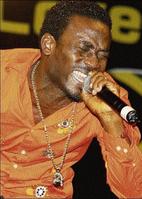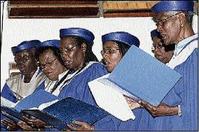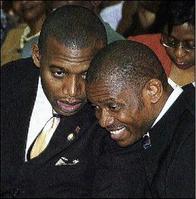Krista Henry, Staff Reporter
DJ Nicholas says Prodigal's 'Journey Continues' is one of the dancehall gospel songs played in church. - Colin Hamilton/Freelance Photographer
Taking the gospel outside of the hallowed precincts of the church has sometimes been an uphill struggle. However, the increased booking of gospel deejays on secular events is evidence that dancehall gospel is reaching 'the world'. However, can gospel dancehall be received into the sacred places as a regular part of worship services?
Dancehall gospel, which once struck some congregations as being a little bit 'unholy', has won over the multitudes with the praises of the Lord, attracting youths to the faith. The dancehall gospel performers have increased in popularity, with performers such as Stitchie, Moses, Prodigal Son, Ryan Mark, DJ Nicholas and Jason Mighty at the forefront of the holy lyrical war.
But while gospel artistes are saying amen to the change, the question still remains as to the use of dancehall gospel in church.
Karen Cyrus, PhD candidate of ethnomusicology in the Department of Music at York University, Canada, recently presented a paper at the 7th ACS Crossroads Conference at the University of the West Indies, Mona campus. Cyrus tells The Sunday Gleaner that it "has been a frequent practice since the 1990s that reggae is used to accompany singing in many Pentecostal, Pentecostal-like, evangelical, and charismatic churches in Jamaica ... I differentiate between reggae as a style of accompaniment to corporate singing, which is a prevalent practice, and dancehall gospel". She attributes this to the increasing use of band instruments in churches by young musicians who play by ear and usually deliver a reggae beat.
Change of attitude

A section of the Portmore United Church choir sings during a Church Service marking the start of Portmore Week 2007 at the Portmore United Church. Karen Cyrus, PhD candidate of ethnomusicology in the Department of Music at York University, Canada, differentiates between that 'corporate' singing and the dancehall-style performance. - Anthony Minott/Freelance Photographer
Cyrus differentiates between dancehall gospel and corporate singing done in churches saying, "whereas corporate singing entails the whole group singing as one, dancehall gospel performances involve the rapping/deejaying of one person to an audience. Additionally, the lyrics of dancehall gospel songs are usually in Jamaican patios ... which also differs from the corporate singing described above".
She continues, "While the reggae played in the above-mentioned denominations is often very similar to the accompaniment of dancehall gospel, there would have to be a change of attitude towards the use of the vernacular (patios) in the church before the corporate singing of dancehall gospel becomes a staple of Sunday and Sabbath services. In the meantime, dancehall gospel usually exists in spaces outside of the Sunday and Sabbath divine hours. Instead, dancehall gospels DJs are usually used as headliners to support church, school and other community events."
Resistance
Dancehall/reggae gospel artiste DJ Nicholas, who is a deacon in his church at the New Life Assembly, believes there is still a resistance to dancehall gospel in worship services from the church community. However, he sees hope in his music being accepted, based on the invitations he receives from ministers and deacons from various churches to perform at their services.
In his church, Nicholas is well received, sometimes performing for the assembly and also at functions. What is usually played in his church are hymns, choruses and some reggae songs. "They will play some songs with a message like Mi Nah Bow, which was on my first album, and JourneyContinues from Prodigal. From my new album there is Can't Stop, which I believe they will accept," Nicholas says.
Nicholas believes the major objection to dancehall gospel is that church members believe it brings the world into the church. But he disagrees, believing the music of gospel deejays bring the gospel to the world.
Inspiration

Dr Leslie Rogers (left), Prophetic Missions International, Trinidad and Tobago in discussion with Bishop Joseph Ade-Gold, president of Overcomers World Ministries, during Overcomers World Ministries launch of 'Transformation Jamaica: A Music Festival Against Crime & Violence', at the Hilton Kingston Hotel, Knutsford Boulevard, New Kingston, in September 2006. Bishop Ade-Gold says when many churchgoers hear dancehall they do not think it is 'proper'. - Winston Sill/Freelance Photographer
Nigerian-born Bishop Joseph Ade-Gold, founder of Overcomers Christian International, sees dancehall/reggae gospel as an instrument for young people. He has encouraged persons such as DJ Nicholas and Moses to use their music as a form of inspiration. Supporting the two artistes and others of their ilk, Ade-Gold tells The Sunday Gleaner that he even carried his children to the recent launch of DJ Nicholas' album.
"I invite them to services. I don't refer to them as dancehall artistes, but as reggae artistes ... I accept reggae in some forms, but as soon as it gets into dancehall I don't think it's proper. When people hear dancehall they don't think it's proper," he commented. According to Ade-Gold when the dancehall artistes were initially asked to perform the elderly persons in his congregation were hesitant, but they have now become a part of the dancehall gospel movement.

